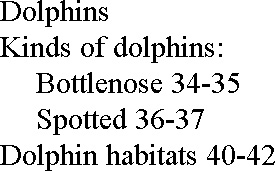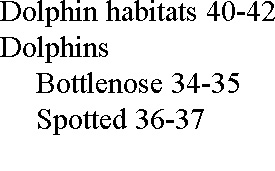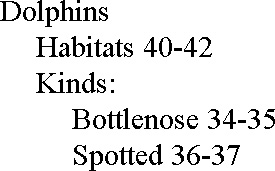I have issues.
Specifically, as we head into our annual celebration of the Criterion Reference Content Tests Festival next week, I have issues with the questions purporting to provide data on our students’ information skills, aka research/reference skills.
Many are innocuous, asking which word comes first in ABC order, which guide words would include a specified topic, that kind of thing. But many are sloppy, betraying outdated perceptions of how research works even at the elementary level, or worse, complete ignorance.
Here are some examples, taken from the practice questions provided by the state, and which I’ve been using in review lessons (The Evil Game) with 3rd graders:
Which do you need to have if you are going to type a story on a computer?
- a database
- the internet
- writing software
“Writing software”?? Even kindergarteners call it a word processor, for heaven’s sake. So what we end up testing is not their awareness of text generation on a computer, but whether they can synonymize an archaic and unfamiliar term with something they use on a regular basis. And of course, it seems that the test makers are unaware that kids have more than a little experience on websites provided by PBS, General Mills, etc., that encourage them to “type a story.” So, if I don’t know what “writing software” is (to practice my handwriting??), and the last time I went to the computer lab we played on the Dora the Explorer website and wrote stories about our adventures, then the correct answer is obviously 2.
To keep a list of all the animals your class saw in a month, which is the BEST to use?
- a database
- a radio
- an encyclopedia
This inclusion of databases as a technology we need to test kids on is very amusing to me, because not even their teachers know how to use one. I mean, they know how to negotiate a database like the county’s Infinite Campus student database, but almost none of them have ever created a database for regular use, nor do they completely understand why one would do so. The reason is simple: Microsoft Office doesn’t come with a database. And for that reason, our teachers are trained to use Excel’s spreadsheets to keep lists of information in. They have no clue as to how that differs from a database like FileMaker or, heaven help us, Access. Do you know how much this makes me despair?
Of course, we know (or hope) that the student will eliminate radio and encyclopedia as choices because they’re just stupid, but then we’re not testing their information skills, are we?
Which do most people use to connect to the internet?
- database
- computer
- videotape
“Connect to the internet.” You mean like when I place my phone receiver in the cradle of my mo-dem and send the AT* commands to it? Confronted with a term he has surely never heard before, a student is thrown back onto his knowledge of what he’s encountered on the internet. Internet Movie Database? YouTube? Hm, your guess is as good as mine.
Read the part of the index below. Which page should you read to find the information on the bottlenose dolphin?

God in heaven. Yes, I know that a child with even half a brain should be able to untangle that, but is there anything correct about that sample’s formatting? It looks like something an actual 3rd grader would produce.
Try this:

Or even better:

You know, like an actual freaking index in an actual freaking book.
Mr. Pope wants to make an apple pie, but he can’t find his cookbook. Which resource is the BEST for Mr. Pope to use to look for another recipe?
- a database
- writing software
- the World Wide Web
Oh, where to begin? This question must have been written in 1998, including such quaint terms as “writing software” and “World Wide Web.” Seriously, does anyone call it the World Wide Web any more? Even the major newspapers have stopped capitalizing Internet and Web. The kids these days simply call it “the internet.” So do I. And once I’ve gone on the “World Wide Web,” where will I find recipes? Let me count the ways. Databases all, and found via Google, itself an enormous database. And what if Mr. Pope has one of these? If we’ve been as thorough in our teaching of databases as these questions seem to imply is our job, this question will thoroughly confuse a student.
Which address on the World Wide Web would MOST LIKELY have information about cats and dogs?
- www.toys.com
- www.pets.com
- www.birds.com
This is not an unfair question, but at my school at least I teach the kids that URLs must not be thought of as search engines, i.e., www.whatIwantofind.com is never the way to navigate the internet. Pardon me, the World Wide Web. Still, as an internet-age version of “Which book title would be best for Topic A?,” it’s unoffensive.
Which is the BEST way to select a topic that you will enjoy for a report?
- Find the topic that looks the easiest.
- Choose a topic that interests you.
- Ask a friend what she wrote about.
All right, I’ll close with a question that I really liked and had fun going over with the kids. What we do in the Evil Game is I show the question on the Promethean Board (a smartboard kind of thing) and ask the kids to hold up little cards indicating whether or not they understand what the test makers are trying to ask them. If I get a smattering of question marks or Xs, we stop and deconstruct the question.
With this one, we actually parsed the gender-specific approaches to the problem. I told the girls that #3 was their answer. When they denied it, I launched into a sample dialog: “What are you going to write about? I’m doing koalas. Let’s both do koalas!” They giggled and copped to the plea. The boys were looking smug, until I pointed out that #1 is the boy answer. They readily admitted to it.
The really interesting thing, I pointed out to them, was that the correct answer is actually ambidextrous. For the boys, the correct answer would be “Choose a topic that interests you.” For the girls, it’s “Choose a topic that interests you.” And along with all that, I gave advice on making the correct answer work in real life as well.
On the whole though, the questions our students will face next week during the CRCT Festival regarding information skills are not up to par. The state is not getting good data about how prepared our children are to engage the information age effectively. And because, as the Curriculum Liberation Front says, what’s unassessed is unaddressed, these flawed test items produce flawed and inadequate information instruction across our state.
C’mon, Dale. You gotta admit, these tests help us figure out who the smartest kids are.
Where to start? Maybe nowhere as I think Dale has done his usual superb job of showing how ridiculous these tests are. Besides finding the idea of using these tests as our sole evaluation of a child obnoxious and then the teaching to the tests just as odious, now we get treated to the fact that the tests themselves are badly written.
Being out of teaching myself I no longer have access to the tests, practice or otherwise. But just from tutoring some kids in neighborhood and hearing their stories of what was on the test last year, I can say that it isn’t just the research/reference skills part of the test that are poorly written. I tutored in Math and I know when a student has a grasp of the concept and should be able to work any problem fairly stated in that area, It infuriates me when they come home saying the test questions didn’t make any sense. I don’t have any specific examples at hand unfortunately, but I am sure it wouldn’t take long to find some on the test.
The state is not getting a good indication of our students math skills, especially in using any kid of reasoning to figure out a problem judging from what I heard last year. I know my information is all anecdotal but I would be glad to look at an example test to examine just how fair and clear the math questions are. I am afraid I would find the same things that Dale found with regard to research/reference skills.
Thanks Dale for taking the time to point out some of the details that just adds to the general argument against this type of “teaching”.
Turff, the tests are not designed to show us the smartest kids. We know that. That’s the upper middle class white kids. And the Asians. The tests are designed so that we can be sure that we are leaving NO CHILD BEHIND.
Dale, I agree about Databases. I took a VERY brief course on them in middle school. Then just a couple of days ago, I went to try to make a database of comedy club bookers. After 45 minutes of just trying to figure out what the hell was going on in Access, I gave up and decided to use Excel.
May I suggest Bento, which is the baby version of Filemaker Pro? Both Mac and PC, so you don’t have come to the light side yet.
Never mind. Mac only. Filemaker is both; I thought Bento was as well.
Oh well. Time to come to the light side.
I have a Mac now. Did I not tell you that?
Oh…Me likey the Bento. I just went to the “See Bento in Action” Page. I got a huge organization-nerd boner.
You did not tell me you had gone Mac. Then yes, get Bento. Whenever I talk about FileMaker and what it can do, my eyes glaze over with ecstasy.
This is mostly a Mac community now.
I got the Mac laptop around Christmas. (Right before the Lichtenbergian meeting because I attending the meeting via the Mac.) I still had my PC laptop as well though. Then a couple of weeks ago I got Windows for Mac, so I sold my old PC and now am 100% a Mac user.
As long as I have Windows on there too, I feel good. I have a safety net for when I’m not sure how to do something. Plus I can run some of the more expensive software I have that is PC only.
Unfortunately, Bento, though, is only for Leopard and I have 10.4. Which is a shame. Although, I got the computer second hand from a friend who already had Filemaker on it. So now I just have to start learning how to use that.
To give Turff the benefit of the doubt, I’m pretty sure he was joking. He knows the way to find the smartest people, aside from the socio-economic and geographical indicators Mike referenced, is to take those quizzes on Facebook.
The last question in Dale’s examples was interesting to me because it struck me more as a personality indicator question than a test of knowledge. Or some school-marmish moral lesson masquerading as a test question.
Or once the smartest kids have been identified, John Galt flies them off to his island to play video games and wind surf until the world FALLS TO ITS KNEES.
Finally someone speaks some sense on this question. Thanks, marc. And in the spirit of openness, I was baiting.
And btw, Mike’s comment (#3) had me seriously ROFLMAO.
This is Becky writing on Kevin’s space. 🙂 I am very happy that the private school our children attend do not use this ridiculous test. I think the way this is written is an insult to students and would probably make our girls angry. The last thing our house needs is more pre-teen, female angst.